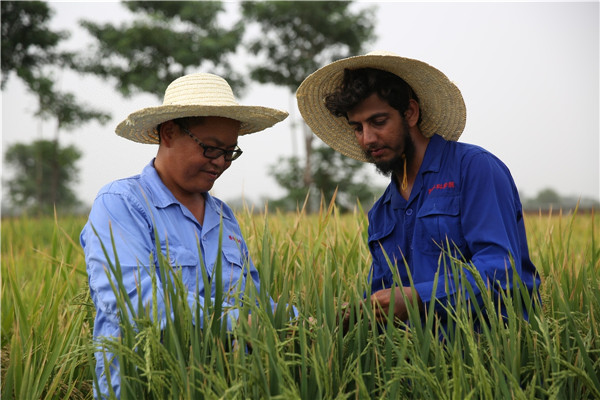China-Pakistan science cooperation continues online

Long Ruijun (left), a professor at Lanzhou University in Northwest China's Gansu province, works in the field with an assistant in Pakistan, on July 10, 2019. [Photo/Xinhua]
Due to the COVID-19 pandemic, 57-year-old Long Ruijun, a professor at Lanzhou University in Northwest China's Gansu province, turned to online lectures to help old friends in Pakistan fight energy and food shortages.
Long routinely visited the country between 2016 and 2019 to share agricultural techniques and skills with Pakistani experts and farmers.
"The landscape and climate in Gansu are similar to Pakistan, especially the northern region," he said.
"So our agricultural experience is a useful reference for them."
Due to power shortages, people living in Pakistan's mountains often had difficulty pumping water to irrigate their land.
To solve this problem, Long and his team of 40 researchers introduced solar pumps developed in Gansu to Pakistan in 2018, and the technology was used in test fields.
According to Bashir Ahmad, head of the Pakistani National Agricultural Research Center, if the pumps were more widely used in drought-hit areas in northern Pakistan, the output of crops like wheat could be greatly improved and food security guaranteed.
Noticing the low yield of crops due to poor seed quality, Long's team sent 30 kilograms of alfalfa and oat seeds to their counterparts in May. The team delivered on-site lectures to train Pakistani workers on maintenance and agricultural processing, said Jing Xiaoping, a member of Long's team. With technical support provided by the team via livestreaming, the 30 kg of donated seeds sprouted successfully.
To popularize sustainable, green agricultural development, researchers from Lanzhou University are working with the Pakistan Agricultural Research Council to establish a biomass energy center in Islamabad, to convert agricultural waste into energy.
Long said the technology could be widely used in Pakistan and other Asian countries facing energy shortages. He hopes to deepen cooperation with Central and South Asian countries by setting up more integrated demonstration sites to enhance production, guarantee food security and improve livelihoods.
"Under the framework of the Belt and Road Initiative and the China-Pakistan Economic Corridor, cooperation between Pakistan and China will reap more positive results in more areas," Long said.
More than 100 students from Pakistan have majored in agricultural studies at Lanzhou University, he added.
-
As AI encounters Dunhuang's art, the ancient caisson ceiling bridges centuries to the present.
View all stories

 Gansu thrives from green development
Gansu thrives from green development  >
>